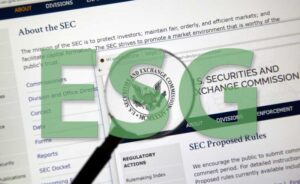 In early 2022, the US Securities and Exchange Commission (SEC) announced a new rule planned to go into effect by the end of the year. The ruling requires publicly traded companies in the US to report Environmental, Social, and Governance (ESG) factors. Furthermore, publicly traded companies must also include these factors in their supply chain. Therefore, most companies will be affected by this new rule. So, if you’re thinking, “this doesn’t affect me because I’m not a large publicly traded company,” read on to find out how you will be affected by these reporting requirements.
In early 2022, the US Securities and Exchange Commission (SEC) announced a new rule planned to go into effect by the end of the year. The ruling requires publicly traded companies in the US to report Environmental, Social, and Governance (ESG) factors. Furthermore, publicly traded companies must also include these factors in their supply chain. Therefore, most companies will be affected by this new rule. So, if you’re thinking, “this doesn’t affect me because I’m not a large publicly traded company,” read on to find out how you will be affected by these reporting requirements.
What is ESG and Why Is It Important to Investors?
ESG stands for Environmental, Social, and Governance. Companies report ESG factors to disclose consistent, comparable, and reliable information to their stakeholders about these issues. To investors, awareness and reporting on ESG factors are synonymous with risk mitigation. In the following list, I provide some examples.
Environmental
- Carbon emissions;
- Energy efficiency;
- Natural resource use;
- Waste; and
- Other environmental sustainability initiatives
Social
- Workforce health and safety;
- Diversity;
- Data security;
- Privacy policies;
- Employee training; and
- Community programs
Governance
- Business ethics;
- Board diversity; and
- Management policies
Digging Deeper Into Carbon Emissions
One of the aspects of the new SEC reporting requirements that will send a shock wave through the supply chain is the reporting of carbon emissions. In addition, the new rule requires the disclosure of not just the reporting company’s emissions but also the emissions associated with their supply chain.
Classifications of Emissions
When discussing carbon emissions and greenhouse gas reporting, you will hear the terms, “Scope 1 Emissions, Scope 2 Emissions, and 3 Emissions”.
- Scope 1 – are the direct emissions from the reporting company’s facilities and their company vehicles.
- Scope 2 – are the indirect emissions from purchased electricity, steam, heating, and cooling associated with the operation of the reporting company.
- Scope 3 – are the indirect emissions from all upstream and downstream activities. These upstream and downstream activities include all the companies associated with the reporting company at any point in the supply chain, including:
- Purchased goods and services;
- Capital goods;
- Transportation and distribution;
- Waste generated;
- Processing of sold products;
- Use of sold products; and
- lastly, End-of-life treatment of sold products.
While this list isn’t all-inclusive of Scope 3 Emissions, it represents the categories most relevant to our clients.
Taking a Broad View of Emissions
A broad view of emissions includes the entire product life cycle from cradle (raw materials from nature) to grave (end-of-life disposal or recycling). Therefore, emissions involve a lot of companies across an incredible breadth of industries and geographies.
Reporting on Scope 3 Emissions is considered vital by shareholders of large publicly traded companies. That’s because Scope 3 Emissions typically represent a more significant environmental impact than the large publicly traded company’s Scope 1 and 2 Emissions.
Large publicly traded companies are already reaching out to their suppliers to understand the carbon emissions of their operations. Likewise, those suppliers are demanding emissions information from their suppliers. This reach-back into the supply chain, all the way back to raw materials from nature, is how many small, privately-held companies will be involved in emissions reporting.
How Will This Impact My Company?
Typically, customers will indicate expectations from their suppliers regarding ESG or sustainability and specify what information they require. Requests can take on many forms. In the following list, I show some of the most common ones I see.
- Complete a survey asking questions about ESG-related topics;
- Establish and share quarterly reports on 3-5 ESG-related metrics that your company monitors;
- Identify 3-5 goals from the United Nations Sustainable Development Goals, on which your company will monitor and report;
- Become compliant with or certified to ISO 14001;
- Provide a Life Cycle Assessment (LCA) for the product or service you are selling; and
- lastly, Report on your company’s Scope 1 and 2 Emissions
When asked for this information, it’s crucial to take it seriously. Ignoring ESG requests and thinking it will go away has resulted in:
- escalation of the data requests to higher levels within the company;
- reduction in status on approved supplier lists;
- cancellation of orders; and
- as a result, even loss of that customer.
